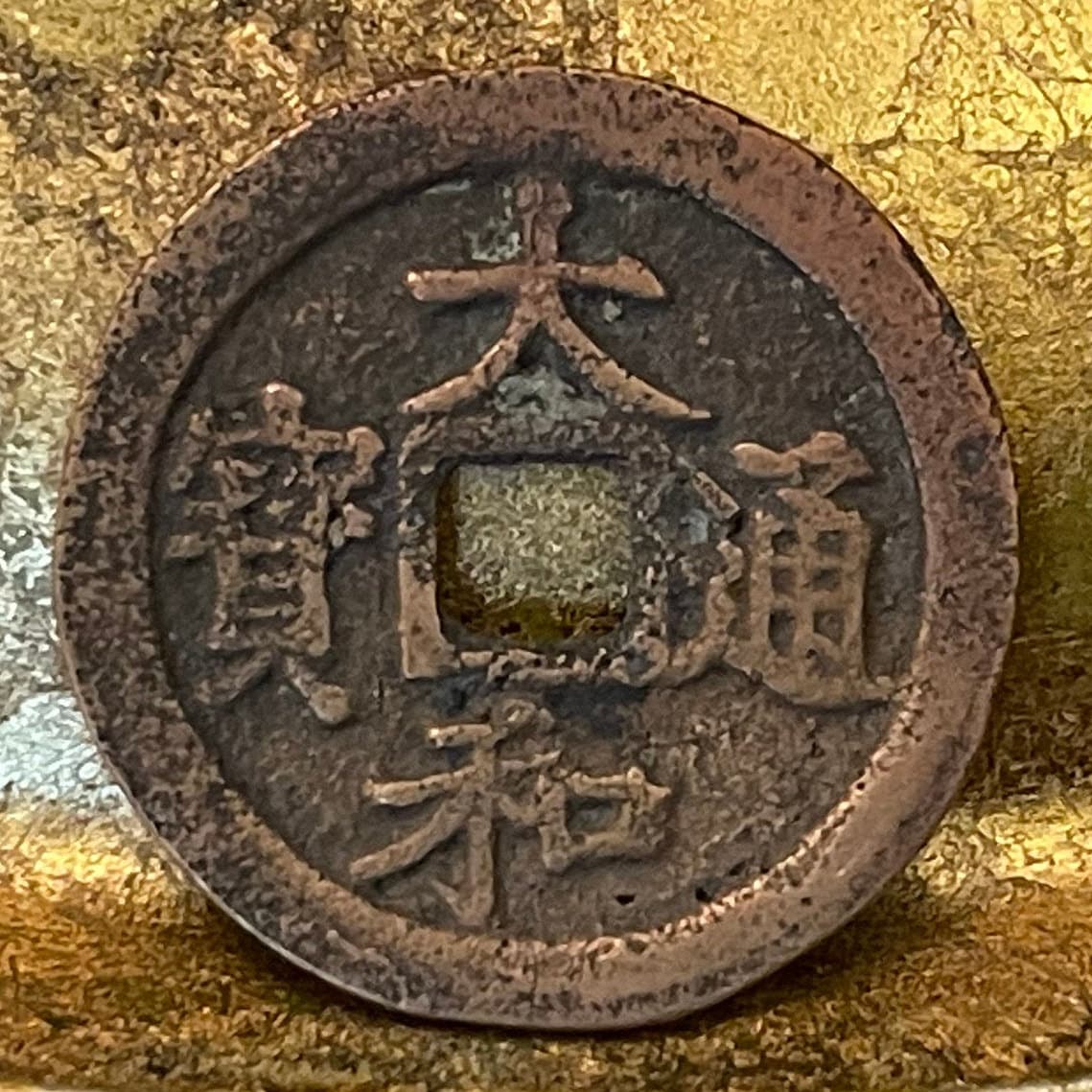elemintalshop
Empress Dowager Tuyên Từ (Date: 1443-1453) Đại Hòa Thông Bảo Reign Title for Child Emperor Lê Nhân Tông 1 Văn Vietnam Authentic Coin FAIR
Empress Dowager Tuyên Từ (Date: 1443-1453) Đại Hòa Thông Bảo Reign Title for Child Emperor Lê Nhân Tông 1 Văn Vietnam Authentic Coin FAIR
Couldn't load pickup availability
15th Century Vietnamese Coin for the Childhood Portion (Age 2 to Age 12) of the Reign of Assassinated Child Emperor Lê Nhân Tông (Power Behind the Throne was Empress Dowager Tuyên Từ -- AKA Nguyễn Thị Anh )
Obverse: Official Reign Title for Lê Nhân Tông's royal reign, up to the age of 12: "Đại Hòa Thông Bảo"
Lettering:
大
寶 通
和
Features
Issuer Empire of Vietnam
Emperor Lê Nhân Tông (1442-1459)
Type Standard circulation coin
Years 1443-1454
Value 1 Cash (0.01)
Currency Lê dynasty - Tiền (1428-1788)
Composition Bronze
Diameter 25 mm
Shape Round with a square hole
Demonetized Yes
Number N# 19713
References Toda# 54
Wikipedia: Vietnamese era/reign names were titles adopted in historical Vietnam for the purpose of year identification and numbering.
(Era/reign names originated in 140 BCE in China, during the reign of the Emperor Wu of Han. Since the middle of the 6th century CE, independent Vietnamese dynasties started to proclaim their own era names.)
Wikipedia: Despite bearing the reign title "Thái Hòa Thông Bảo" all coins actually bear the inscription "Đại Hòa Thông Bảo" (大和通寶).
Reverse: Blank
Wikipedia:
"The nearly 20-year period when Vietnam was essentially ruled by a woman." [1442-1453 Đại Hòa Thông Bảo period when Lê Nhân Tông was aged 2-12 & subsequent 1454-1459 Diên Ninh Thông Bảo period when Lê Nhân Tông was aged 13-18]
Lê Nhân Tông (黎仁宗, 28 May 1441 – 25 October 1459), birth name Lê Bang Cơ (黎邦基) was emperor of Vietnam, the third monarch of the House of Lê from 1453 till his murder in a coup in 1459. He was a grandson of the hero-emperor Lê Lợi. During nearly all of his short reign, the real power behind the throne was his mother, Empress Dowager Tuyên Từ, a Royal Consort of Emperor Lê Thái Tông.
Biography
With the sudden death of Lê Thái Tông, his heir was an infant son named Bang Co, mothered by Royal Consort Nguyen Thi Anh. He was the third son of his father, but the elder son (Le Nghi Dân) had been officially passed over due to his mother's low social status.
The government was actually under the control of Trinh Kha. Trịnh Khả was a long-time aide, friend, and counselor of Lê Lợi. By 1442, he was the first among the surviving top aides of Lê Lợi, the others had been killed or were second rank. Despite the dangers of having an infant on the throne, the government seems to have run well with no serious problems. The mother of the emperor, Empress Dowager Tuyên Từ was around 21 years old when her son was appointed the future emperor, over time she assumed more power in the government.
The next 17 years were good years for Vietnam. While some disputes surfaced between the Confucian scholars and the noble families, by and large things were fairly peaceful and prosperous for the country.
The king of Champa, Maha Vijaya, raided Hoa-chau in 1444 and 1445. The Court of Annam sent messages to the Zhengtong Emperor of Ming China protesting these raids. The Ming did nothing other than rebuke Champa, so in 1446 the Vietnamese sent an army under the command of Le Kha and Le Tho to enter Cham territory. The campaign was successful, with the capture of the Cham capital Vijaya. "Maha Vijaya was made prisoner with his wives and concubines, elephants, horses, and weapons."
The Vietnamese were driven out a year later. However, the Cham did not mount another offensive against the Vietnamese for the next twenty years.
In 1451, for reasons that are unclear, Anh ordered the execution of Trịnh Khả and his eldest son. Two years later, Trịnh Khả was officially pardoned along with several other close advisors to Le Loi who had been killed (like Lê Sát). The pardon occurred in conjunction with the official ascension to power of Lê Nhân Tông, though he was only 12 years old at the time.
It is unknown why a 12-year-old boy was formally given the power of government since ancient Vietnamese custom stated that power could only be given when a boy became a man at the age of 16. It may have been done to remove the Empress Nguyen Thi Anh from power, but if that was the reason, it failed- the young emperor's mother still controlled the government up until the 1459 coup.
In 1459, Lê Nhân Tông's older brother, Lê Nghi Dân, plotted with a group of officials to kill the emperor. On October 28, the plotters with some 100 "shiftless men" entered into the palace and killed the emperor (he was just 18). The next day, facing certain execution, his mother, Empress Dowager Tuyên Từ, was killed by a loyal servant.
So ended the nearly 20-year period when Vietnam was essentially ruled by a woman. Later Vietnamese historians offered two different pictures of this time, one court historian said this was a period of benevolent rule, with harmony in the court and idyllic peace in the land. Another history says the court was in chaos and that having a woman rule the state was as unnatural as "a hen crowing at daybreak". Good counselors like Trịnh Khả had been removed from office and inept men had been elevated, bringing oppression and calamity to Vietnam.
Lê Nghi Dân would not long enjoy his rule; he was removed from power and killed in a counter-coup just 9 months later. The next emperor of Vietnam was the last son of Lê Thái Tông: Lê Thánh Tông, perhaps the greatest emperor in Vietnamese history.
********
Wikipedia:
Nguyễn Thị Anh (Hán tự: 阮氏英, 1422 - 1459) was a concubine consort, empress dowager of Lê dynasty, mother of the emperor Le Nhan Tong. She was official regent of Annam about 1442 - 1453 during her son's minority, and effective head of state from 1451 until she allowed a servant to kill her in 1459 to avoid being captured or killed in a coup.
Royal concubine consort
Nguyễn Thị Anh was a beautiful woman of noble birth (perhaps related to general Nguyễn Xí). In 1440 she became a consort of the young king Le Thai Tong at the same time as Ngô Thị Bính. They both attracted the King's attention and both gave birth to sons shortly before the king, Lê Thái Tông, died in 1442. Although the king had an older son, Nghi Dân, that boy's mother was not from a noble family and he was passed over, instead the kingship was given to Nguyễn Thị Anh's son, now called Lê Nhân Tông.
Regent
At the time of his elevation to the kingship of Annam, Lê Nhân Tong was just an infant (just over one year old). By tradition, the infant king's mother had great power and she was also officially named the regent on behalf of her son. In reality, the real power behind the throne was Trinh Kha, a close friend and senior advisor to Lê Lợi.
Together, Trinh Kha and Nguyen Thi Anh managed to rule Vietnam reasonably well, though there was some friction. This friction grew as they clashed over how the king should be educated and who really got to make decisions in the government. In 1451 Nguyễn Thị Anh ordered the execution of Trinh Kha and his eldest son. The reason for this is lost and just two years later, Trịnh Khả was officially pardoned and his family was given new lands.
De facto ruler
Nguyễn Thị Anh's son, Lê Nhân Tông was officially given the powers of government in 1453 even though he was only 12 years old. This was unusual and seems to have made little real difference, the empress dowager ruled while the other noble families acted as a brake on her power.
The government did not do very much during this time, one later Vietnamese historian said this was a peaceful, harmonious time. The official court history written some 30 years later said it was a time of calamity for Vietnam and that for a woman to rule was as unnatural as "a hen crowing at daybreak".
In 1459, the oldest son of Lê Thái Tông, Nghi Dân, staged a coup. He and some 100 men secretly entered the palace late in October and killed the king. The next day, Nguyễn Thị Anh, facing certain death at the hands of Nghi Dân's men, allowed herself to be killed by a loyal servant.
The rule by Nguyễn Thị Anh was far from a disaster for Annam but equally, not much happened. Certainly there was a marked contrast between her rule, and the rule of her husband's own son, Le Thanh Tong.
Share










Wish I had a million more!
This is a great coin. Yes, it's worn, but that's part of its character.
Great old item, was in better condition than I expected. Very happy with my purchase.
Everything went well with the transaction. I would recommend the seller.










